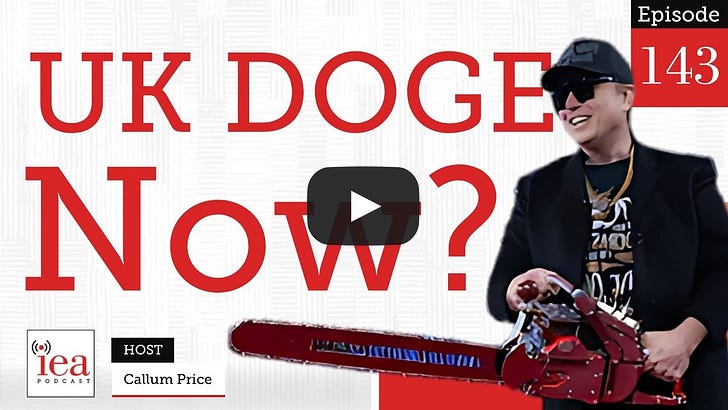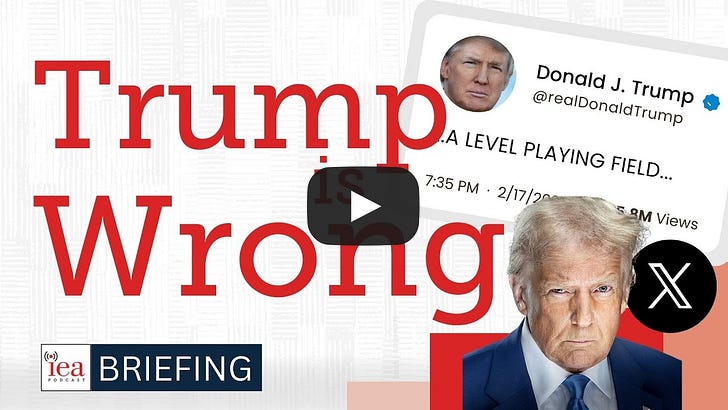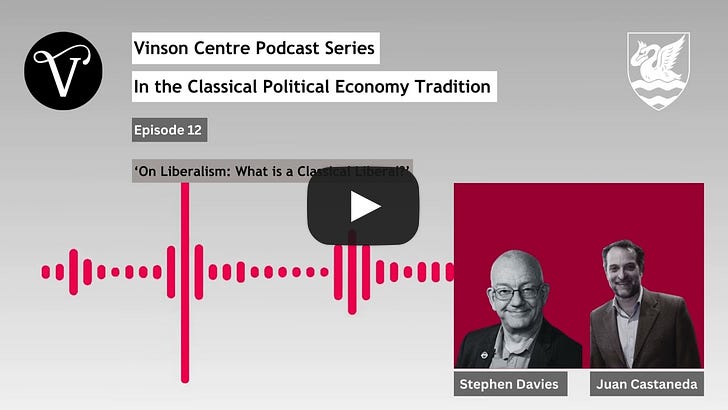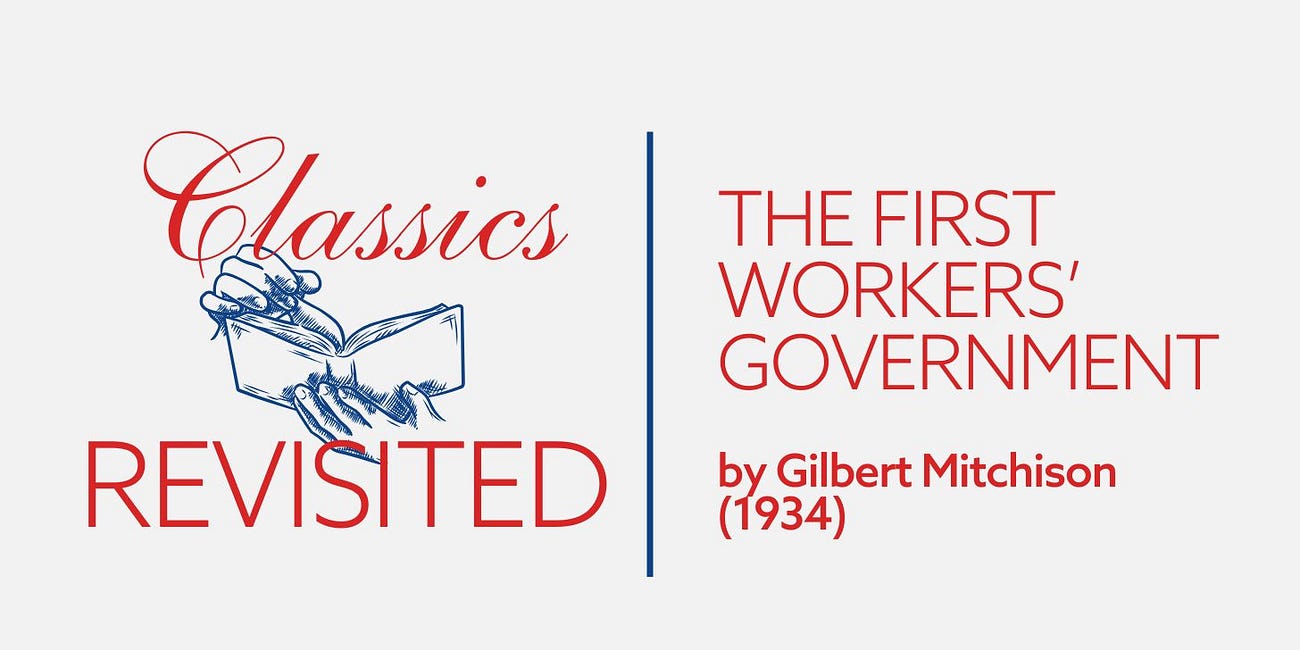|
 |
Do we need a British DOGE?
Plus: abolishing trade restrictions to cut costs for consumers, and stagflation-lite on the horizon
In today’s newsletter:
Is it time we brought the chainsaw to Britain?
Inflation rises
What would socialism in Britain look like?
and more….
DOGE’s ongoing cost-cutting in the USA has shone the spotlight on how much taxpayers’ money is diverted to private interest groups to provide services that are far from essential. Should the UK follow suit?
Indignant bosses of state-funded NGOs have a range of justifications for dipping their hand in the taxpayer’s pocket. They will splutter something about upholding Britain’s ‘soft power’ abroad and will usually be able to point to some unambiguously worthy cause they have contributed to. But the examples of wasteful, self-indulgent and ideologically driven boondoggles are too numerous to ignore.
The scale of the unproductive non-profit sector has grown so large as to be unfathomable. If you take state-funded ‘civil society’ groups alongside preposterous arts funding, frivolous academic research, wasteful foreign aid and racist DEI schemes, it is clear that there is a vast slush fund available to people with the right opinions and connections. It came as no great surprise when Rory Stewart’s wife turned out to be one of the ‘victims’ of DOGE. Her charity Turquoise Mountain, which once explained post-modernism to Afghan women, will miss out on $1 million as a result of the clampdown.
State-funding of private interest groups has been endemic in the EU for years, but some MEPs have had enough. In November, it was revealed that the European Commission has been giving grants to environmental groups with the specific proviso that they lobby MEPs. NGOs have now been told that the EU’s €5.4 billion LIFE fund cannot be used for lobbying, leading to NGOs howling about being ‘muzzled’ and complaining about democracy dying.
This racket – for that what is what it is – is economically damaging in three ways. It directly puts a cost on taxpayers, it turns people who could be wealth-producers into wealth-consumers, and, in the case of state-funded pressure groups, it leads to policies that further constrain economic growth. The sledgehammer approach of DOGE is bound to lead to some worthwhile government initiatives being abolished, but there may be no alternative. It is not as if there is a shortage of charitable trusts and billionaire philanthropists to step in to help the likes of Turquoise Mountain if their activity genuinely relieves human suffering.
Quangos and NGOs who have survived ‘austerity’ and the ‘bonfire of the quangos’ can be expected to survive another round of half-hearted cost-cutting. The journalist Charlotte Gill, who has spent months looking under the bonnet of the shadow blob, has found a number of grant-making bodies that could be abolished overnight. This seems a good place to start. Afuera!
Christopher Snowdon
Head of Lifestyle Economics
P.S. The best way to never miss out on IEA work, get access to exclusive content, and support our research and educational programmes is to become a paid IEA Insider.
IEA Podcast: Editorial Director Kristian Niemietz, Head of Lifestyle Economics Chris Snowdon, and Director of Communications Callum Price discuss whether Britain needs its own DOGE and whether we need to re-industrialise, IEA YouTube.

UK economy heading for 'stagflation-lite', IEA Economics Fellow says
Commenting on the rise in inflation to 3%, Julian Jessop said:
The jump in headline inflation to 3% in January adds to evidence that the UK is heading for ‘stagflation’ – a nasty combination of stagnating economic activity, rising inflation, and increasing job insecurity.
This outbreak could still be mild by past standards, and so best described as ‘stagflation-lite’.
3% inflation is still tolerably low, and there were some special factors last month including the volatility of air fares and some (hopefully) one-offs, including the extension of VAT to private school fees.
There is some evidence too that firms are already passing on the increases in labour costs as a result of the Budget. This at least reduces the chances of a further jump in inflation when the national minimum wage and employers NI actually rise in April.
Nonetheless, higher inflation will undermine two of the foundations of any recovery in consumer confidence and spending – rising real wages and hopes of further interest rate cuts.
The renewed increase in food price inflation will be particularly worrying for households on lower incomes.
Moreover, the Bank of England is now more likely to leave rates on hold again until May.
In summary, not yet panic stations, but definitely some more bad news.
Coverage includes The Daily Mail and The Telegraph
News, Views & Upcoming Events
‘Unfair Trade’ is better than Trump’s Tariffs, Editorial Director Kristian Niemietz explains the benefits of ‘unfair trade’ and critiques the ‘sports competition fallacy’, IEA YouTube

Public Policy Fellow Matthew Lesh decries realigning with EU standards as representing ‘the worst of both worlds’, GuidoFawkes
The budget ‘unequivocally harmed business and the economy but there is still time to fix things’ according to Callum Price in The Express
IEA research calling for a radical transformation of the NHS was referenced in CityAM
What is a classical liberal? Senior Education Fellow Dr Steve Davies discusses with Juan Castaneda on the Vinson Centre Podcast

IEA analysis of the size of the illegal cannabis market in the UK was picked up in the Guardian
You’re currently a free subscriber to Insider. For the full experience, upgrade your subscription.
Paid subscribers support the IEA's charitable mission and receive special invites to exclusive events, including the thought-provoking IEA Book Club.
We are offering all new subscribers a special offer. For a limited time only, you will receive 15% off and a complimentary copy of Dr Stephen Davies’ latest book, Apocalypse Next: The Economics of Global Catastrophic Risks.




![[INVITATION] Labour Reimagined: Policies for the Future of Work?](https://substackcdn.com/image/fetch/w_1300,h_650,c_fill,f_auto,q_auto:good,fl_progressive:steep,g_auto/https%3A%2F%2Fsubstack-post-media.s3.amazonaws.com%2Fpublic%2Fimages%2F90c3d22c-bd3c-4a62-b3b6-5c6f74ab65ad_1920x1080.png)
![[INVITATION] Not Invented Here](https://substackcdn.com/image/fetch/w_1300,h_650,c_fill,f_auto,q_auto:good,fl_progressive:steep,g_auto/https%3A%2F%2Fsubstack-post-media.s3.amazonaws.com%2Fpublic%2Fimages%2F8a6321e0-fe77-45a1-b638-e0b31a4b8112_1920x1080.jpeg)
